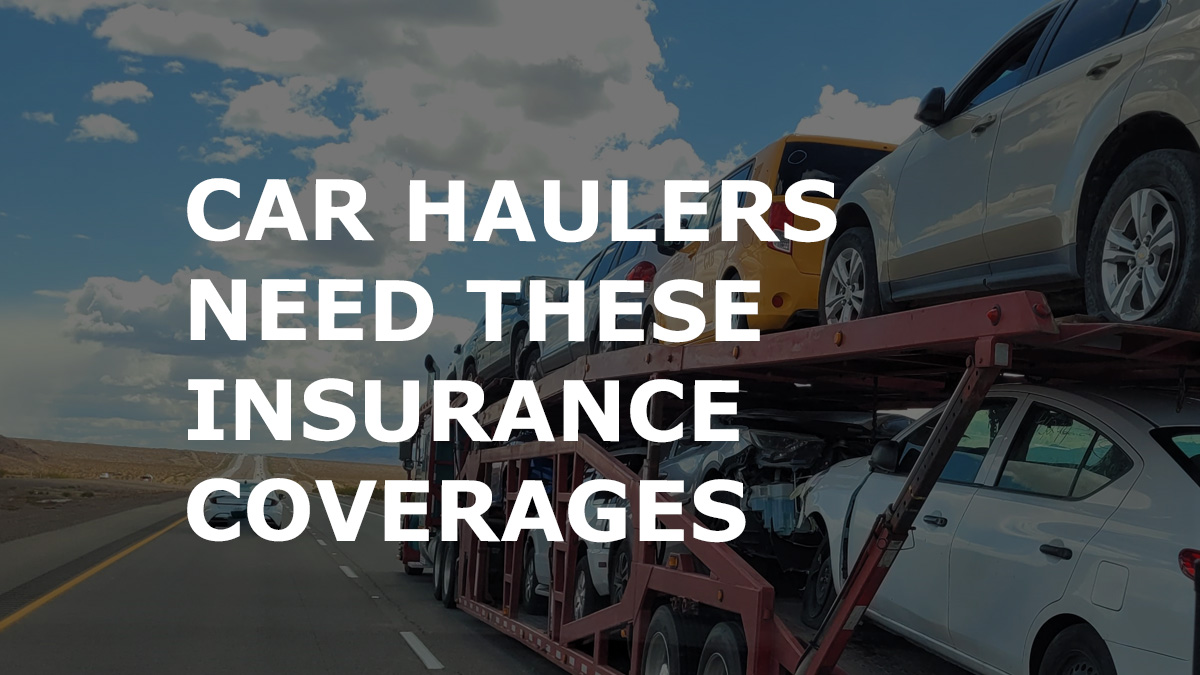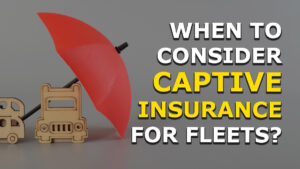We see many auto haulers lose loads because they could not GET coverage as it is expensive and greatly differs from traditional trucking insurance.
The nearly 5,000 car haulers in the United States can make great money in the over $10 billion auto transport industry if they know what they are doing. And this starts with knowing your risks and what insurance coverage you need to protect your business.
But it’s not an industry you can just easily step into as it is one of the more difficult trucking segments to enter as a new nine- or 10-car trailer can cost upwards of $90,000.
When it comes to insurance, having driving experience with hauling general freight in a dry van won’t be enough.
Insurers want to see drivers with open air cargo experience (like flatbeds or low boys) where drivers deal with strapping down cargo securely and difficult maneuvering driving skills.
This will help you get more affordable insurance.
But what type of coverage do car haulers need? Let’s take a closer look.
BASIC INSURANCE COVERAGE
First off, it is important to note that all business are different, even for car haulers.
Insurance coverage and cost will vary depending on your specialty.
For example, if you haul brand new cars for a car dealership then you’ll likely pay more for insurance than hauling totaled or broken down vehicles for an auto body shop.
Make sure your insurance agent fully understands your business model before asking for a quote.
General auto liability: While the FMCSA requires $750,000 minimum auto liability for most carriers, auto haulers meet the definition of “Hazardous material” in 49 CFR 171.8 under “Vehicle, flammable gas powered” and “Vehicle, flammable liquid powered”. For that reason, vehicles transporting other vehicles must carry at least $1,000,000 of general liability insurance.
Truck Cargo coverage: Especially for auto haulers, the most valuable asset in your business is the cargo you haul. Cargo coverage is custom evaluated for the type of commodities hauled and the requirements of the shipper. However, most carriers and owner-operators carry $250,000 in cargo insurance to protect the cars.
But you need to be aware of cargo sub-limits.
While a policy may provide $350,000 in total cargo coverage limits for a load, it may contain a $40,000 sub-limit. This means if a motor carrier is hauling a load of 8 vehicles with a total value of $320,000, however one of those vehicles is valued at $60,000. If the motor carrier’s cargo policy has a sub-limit of $40,000, the motor carrier would have to pay $20,000 out of pocket.
Physical Damage Insurance Coverage: While not required, if your vehicle is leased, then you are most likely required to have Physical Damage insurance. Your truck could be damaged in an accident or from another disaster. It could be stolen or vandalized.
Physical Damage coverage offers:
- 24-hour collision coverage for damages to your tractor or trailer
- Collision, Comprehensive or Specified perils
- Aggregate and combined deductibles
- Rental reimbursement
- Gap coverage
- Personal effects for drivers
- Towing coverage
- Electronic Equipment coverage
- Downtime Loss Expense
Uninsured Motorist/Underinsured Motorist Coverage: Again, while not required, both Uninsured and Underinsured Motorist Insurance Coverage will cover you if a person is not insured or just doesn’t have enough coverage to pay for damages. The coverage offers protection against medical expenses like medical bills and can even help with lost wages and pain and suffering, something that you will not get from your standard coverage. Some states have limits at $3,500, be sure to work with your agent to learn what you need.
SPECIALTY INSURANCE COVERAGE
Garaging coverage: There are a couple different types of garaging coverage to be aware of as a car hauler. These are: Garagekeepers coverage and On-Hook coverage.
Garagekeepers coverage is necessary and will protect you when you are in possession of customer vehicles. This coverage protects you against things like fire, theft, vandalism, or a collision with a vehicle they are hauling. Coverage is limited to “Motor Vehicles” and does not cover cargo or items in tow other than licensed motor vehicles. Also, this coverage is dependent upon the state you are in, but usually, with a maximum available limit of $2,500 per occurrence.
On-Hook coverage is part of a garage policy that pays for damages to a vehicle, such as fire or collision, while the car is in tow. This coverage applies in all states except Texas and Virginia where On-Hook Towing insurance is called Garagekeepers Legal Liability insurance and their Garagekeepers Legal Liability insurance is called Storage Location insurance.
Manifested Auto Coverage: What happens if you are driving cars on or off the truck or driving them in a lot and hit someone or something hits you? Most smaller fleets have their vehicle’s vin number specifically listed on the policy. But this is not true for your cargo you may be driving around.
If, while driving a truck/trailer unit, your driver runs into another vehicle, damage to the cargo unit itself would likely be covered under your cargo policy. However, there would be no coverage for the damage to the other vehicle or the bodily injury to a pedestrian. That is where manifested insurance coverage comes in.
Constructive Total Loss Coverage: Constructive Total Loss (CTL) is when a new car suffers damage while in transit and the manufacturer cannot certify the vehicle as safe to enter commerce (sold as a new car). This damage can appear to be minor, but the repairs meet the criteria that the manufacturer deems the car must be destroyed or otherwise not be sold.
Often insurance company policies do not cover CTL or have policy language that leaves the motor carrier with little option other than to pay the claim out of pocket.
Diminished Value Coverage: Your cargo insurance will only cover repairs if a car is damaged in an accident, being removed from the trailer, etc. What it will not cover is the loss that a car dealer takes when the value of the brand-new damaged vehicle after it was repaired. This is where Diminished Value Coverage comes in, which will account for the actual or perceived loss in market value or resale value.
Sometimes the diminishment in value is set by contract as a percentage of the value of the vehicle or determined by the car being sold at auction. The motor carrier is then billed the difference between the pre-damaged value and the auction price.
Claims of this type are very common in the auto transport business and can range from a few thousand dollars to tens of thousands of dollars per unit damaged.
Over height loads coverage: This coverswhen a load is too high, and damage occurs while passing under a bridge, overpass, or low structure spanning across the roadway overhead. Many policies do not include this basic coverage.
Unattended vehicle coverage: When a tractor/trailer is left unattended and a theft or accident occurs, many policies have exclusions to avoid covering this type of loss. If normal reasonable measures are taken to prevent this from happening, then the coverage will cover Burglary or Theft costs.
CNS Insurance can help
If you are interested in getting complete coverage for your car hauler fleet, please call CNS Insurance at 717.625.0066 or email us at info@cnsinsures.com.
Need a full Commercial Truck Insurance quote? Expedite the quoting process by filling out a Complete Insurance Quote with all your vehicle and driver information.






